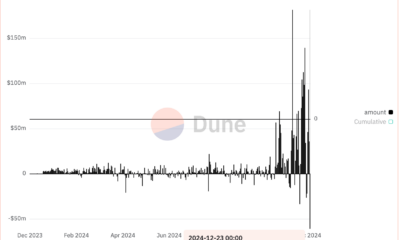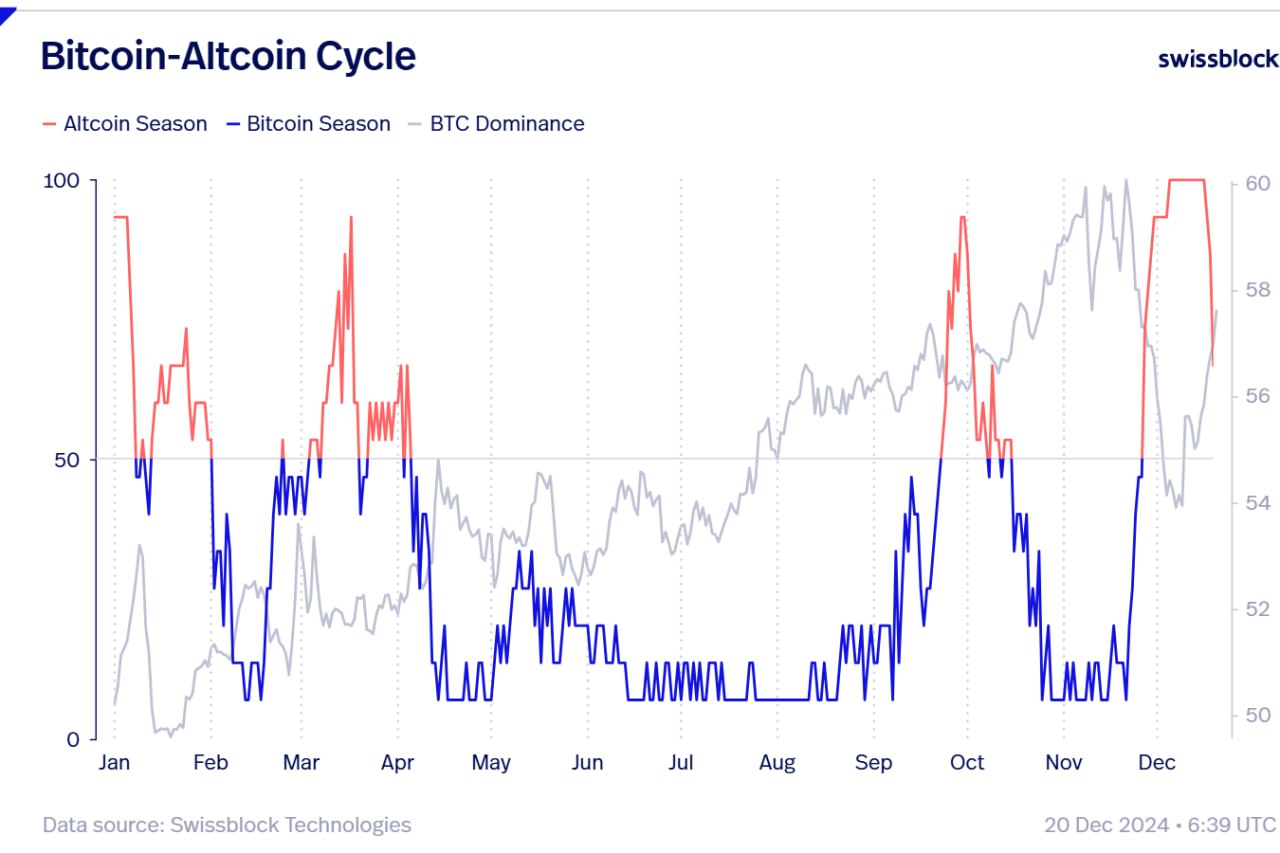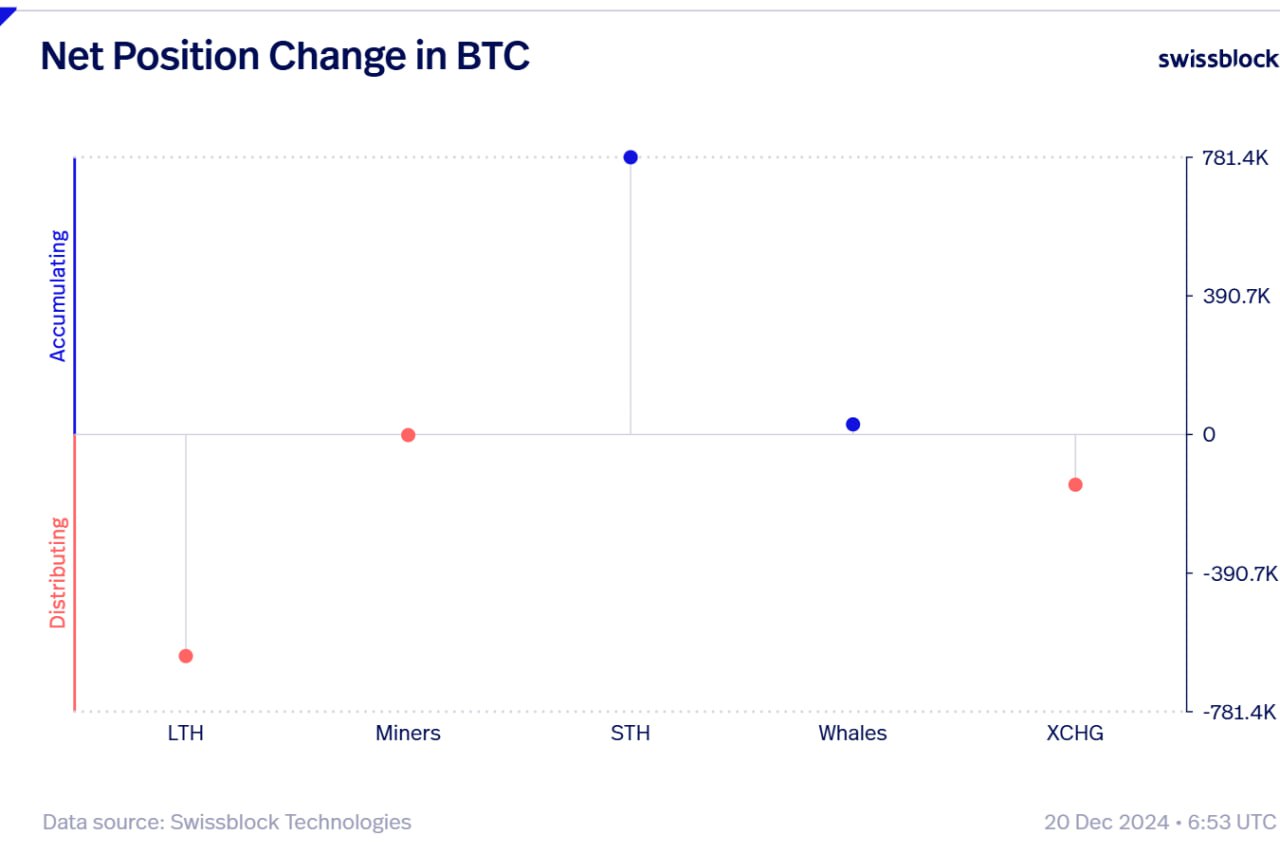Bitcoin
Human Rights Foundation Grants 10 Bitcoin to 20 Projects Worldwide
Published
3 months agoon
By
admin

Today, the Human Rights Foundation (HRF) announced its most recent round of Bitcoin Development Fund grants, according to a press release sent to Bitcoin Magazine.
10 BTC, currently worth $590,000 at the time of writing, is being granted across 20 different projects around the world focusing on technical education for people living under authoritarian regimes, Bitcoin development conferences, decentralizing mining, and providing human rights groups with more private financial solutions. The main areas of focus for these grants center around Latin America, Asia, and Africa.
While the HRF did not disclose how much money each project is receiving specifically, the following 20 projects are the recipients of today’s round of grants worth 10 BTC, or 1 billion satoshis, in total:
African Bitcoiners, a community dedicated to onboarding Africans to Bitcoin. Key initiatives include a “Bitcoin for Beginners” course, free Lightning payment routing for merchants, and the ability to buy airtime and data with Bitcoin. With the continent plagued by political and economic turmoil, Bitcoin can serve as a path to financial sovereignty. Funding will support the production of educational materials and support operational expenses, including salaries, infrastructure, and tools.
Stratospher, a Bitcoin Core developer focused on enhancing the privacy and decentralization of the Bitcoin protocol. Their work includes improving peer-to-peer (P2P) network privacy, reviewing critical pull requests in the libsecp library, and mentoring of new talent. Their work is important in helping protect users from financial surveillance and censorship by authoritarian regimes. This funding will support their full-time development efforts.
Coracle, a Nostr web client designed to create a social media experience that empowers individuals. Developed by hodlbod, recent and planned updates include customizable and shareable feeds, improved direct messaging for privacy, and the development of encrypted public and private communities. By leveraging Nostr, Coracle could offer a new censorship-resistant communications platform for human rights activists. Funding will support the hiring of a full-time developer.
Harbor, an open-source ecash wallet built to provide better Bitcoin privacy. Started by the Mutiny team, Harbor is now an independent project led by Ben Carman and Paul Miller. Harbor incorporates multiple mints, is Tor-only, and automates fund management. Financial tools like Harbor can help empower human rights defenders facing government surveillance by offering strong privacy guarantees. This grant will support the development of Harbor’s 1.0 production release.
The 256 Foundation’s mission is to make Bitcoin mining free and open, supporting developments in the Bitaxe initiative are the flagship project in achieving that mission. Bitaxe provides an affordable entry point for home mining, offering protection against surveillance in authoritarian regimes and enabling individuals to mine Bitcoin discreetly. Funds will support multiple engineers building on and improving Bitaxe with the aim of making the Bitaxe formfactor available with more ASIC manufactures.
Kiveclair, a community in the Democratic Republic of Congo educating individuals about Bitcoin. Led by Gloire Wanzavalere, co-founder of Africa Bitcoin Conference, Kiveclair hosts monthly meetups, training sessions for activists, journalists, and developers, and provides shelter to refugees. It is also planning its first local conference. Funds will cover the cost of meetups, educational materials, equipment purchases, and the rental of an educational space.
Jeff Gardner, a full-time developer focused on bringing end-to-end encryption to Nostr Direct and Group Messages without centralized servers, making them resilient against state intervention. His work is vital for enabling private communication channels for individuals and activists. Funding will support ongoing development, allocating bounties to community contributors, and conducting a security audit of the project.
Silentium, a self-custodial, privacy-focused Bitcoin wallet with built-in Silent Payments. Developed by Louis Singer, Silentium can help protect activists’ financial privacy by enabling them to receive Bitcoin donations through unique addresses generated from a static public key. This prevents surveillance regimes from linking transactions to activist’s identities. This grant will support the wallet’s infrastructure, including a full cloud node, web server, and the hiring of a software developer.
BTC Shule, an educational initiative by Belyï Nobel Kubwayo. It equips Burundians with the knowledge and skills to use Bitcoin for uncensorable payments under Burundi’s authoritarian regime. The project is structured around three key initiatives: a bilingual (Kirundi and French) educational platform, a physical center to host meetups, and a Bitcoin support community via Whatsapp and Telegram. The grant will support the development of the digital platform, educational materials, and the building of the center.
EttaWallet, an open-source, self-custodial mobile Lightning wallet by Collin Rukundo, a software developer and co-founder/CTO of Splice Africa. The wallet is designed to improve usability and accessibility. It seeks to challenge the dominance of custodial wallets and empower citizens in the Global South to take full control over their funds. This grant will support further development of the wallet, improve localization efforts, and foster a growing community of users.
Tor relay operator associations to support increased network reliability and performance, as recommended by the Tor Project. Funding will allow relay operator associations to deploy nodes that improve the stability and reliability of onion services and increase network robustness against DOS attacks. Tor is vital to human rights activists, as well as Bitcoin and Lightning nodes that use onion services.
Rikto Xonghoti, a Bitcoin education initiative led by Anurag Saikia, Basanta Goswami, and Pallab Goswami. Focused on creating a Bitcoin circular economy in the state of Assam (a region marked by underdevelopment), the project offers online Bitcoin education in Assamese. It also plans to establish a physical Bitcoin center in the town of Titabar. This grant will support teacher salaries, the center’s development, and the acquisition of Bitcoin nodes and mining equipment to boost local economic growth.
Yes Bitcoin Haiti, a grassroots organization led by Val, Papouche, and Armand. It seeks to empower Haitians living in political and financial turmoil with Bitcoin. As a new project, it will proceed in phases: first, project leaders will complete the Bitcoin Diploma course offered by The Core; next, they will translate educational materials into Haitian Creole and host workshops. Funding will support project leaders’ salaries, the purchase of equipment, and the production of educational materials.
Bitcoin Indonesia, an educational initiative led by Dimas, Marius, Keypleb, and Diana. It focuses on building an educational platform in Bahasa Indonesia (local language), expanding the local Bitcoin community, and connecting Indonesian talent with Bitcoin-related companies to drive career opportunities. It has also successfully hosted the country’s largest Bitcoin conference. This grant will support content creation, community outreach, and operational expenses.
Bitcoin++, a Bitcoin-only developer conference series organized by software developer and educator Lisa Neigut. The conference features long-form lectures and workshops for developers eager to dive into the intricacies of Bitcoin technology. Held in cities like Mexico City, Buenos Aires, and Austin, Bitcoin++ has explored key themes like scripts, mempool, and soon, eCash. Funds will cover travel expenses for developers from authoritarian countries to attend the upcoming Bitcoin++ mints ecash conference in Berlin.
TABConf, a Bitcoin conference hosted by Michael Tidwell in Atlanta, GA. Its mission is to create a forum for protocol and application developers to debate and collaborate on Bitcoin. Through collaborative workshops and interactive activities, attendees can share their insights, knowledge, and experience to further Bitcoin development and innovation. Funds will be used to cover conference expenses and travel costs for developers in need of financial assistance.
Baltic Honeybadger, the world’s first non-profit, Bitcoin-only conference hosted by Hodl Hodl. With its cypherpunk roots, the conference fosters discussions on technologies that support financial freedom, security, and privacy, especially for those in authoritarian regimes. Funding will cover travel expenses for activists and human rights defenders to deepen their knowledge on Bitcoin as a human rights tool.
LaBitconf and Descentralizar, two annual conferences in Argentina. LaBitconf, hosted by Rodolfo Andragnes, is the longest-running Bitcoin conference in Latin America. Funds will cover travel expenses for software developers and keynote speakers. Descentralizar, a one-day event held in three cities across the country, offers debates, workshops, and networking opportunities for attendees. Funds will also support travel expenses and conference equipment. Given Argentina’s ongoing economic challenges, these conferences provide an opportunity for Argentines to explore Bitcoin as a tool for financial freedom.
Satsconf, the largest Bitcoin-only conference in South America. Held in São Paulo, Brazil’s economic hub, Satsconf connects the local community with global thought leaders, including macroeconomists, veteran Bitcoin educators, freedom advocates, and developers shaping the future of Bitcoin. Funds will support travel expenses for speakers, event logistics, and the hackathon.
Solidarity Summit: Standing with Political Prisoners, a Vienna-based event organized by Hager Eissa that unites former political prisoners, human rights advocates, and others to address the challenges faced by political prisoners. The Summit promotes dialogue, advocacy, and support for political prisoners worldwide and serves as a catalyst for change. HRF support will help add a financial freedom component to the program. A documentary will also be produced to further highlight these issues. Funds will cover venue and event logistics, program development, speaker costs, and film production.
The HRF is a nonpartisan, nonprofit 501(c)(3) organization that promotes and protects human rights globally, with a focus on closed societies. The HRF continues to raise support for the Bitcoin Development Fund, and interested donors can find more info on how to donate bitcoin here. Applications for grant support by the HRF can be submitted here.
Source link
You may like


Solana beats Ethereum in a key metric 3 months in a row


SCENE’s 2024 Person of the Year: Iggy Azalea


BTC Risks Falling To $20K If This Happens


Most Layer 2 solutions are still struggling with scalability


Here’s why Stellar Price Could Go Parabolic Soon


Perp-Focused HyperLiquid Experiences Record $60M in USDC Net Outflows
24/7 Cryptocurrency News
Robert Kiyosaki Hints At Economic Depression Ahead, What It Means For BTC?
Published
7 hours agoon
December 23, 2024By
admin
Rich Dad Poor Dad author Robert Kiyosaki has issued a stark warning while hinting towards an economic depression ahead. In a recent X post, the renowned author said that the global market crash has already started, as he predicted earlier, which indicates that the financial market might enter a “depression” phase. Notably, this comes as the crypto market records immense volatility, sparking concerns over what’s next for Bitcoin (BTC).
Robert Kiyosaki Hints At Economic Depression Ahead
Robert Kiyosaki, in a recent X post, has revealed a stark warning of a looming economic depression. The Rich Dad Poor Dad author warned that a global market crash has already begun, citing Europe, China, and the U.S. as regions facing significant downturns.
In his post, Kiyosaki urged caution, advising individuals to safeguard their finances and maintain their jobs. “Global crash has started. Europe, China, USA going down. Depression ahead?” he asked while emphasizing the enduring value of assets like gold, silver, and Bitcoin. He added, “For many people, crashes are the best times to get rich.”
This warning aligns with Kiyosaki’s earlier prediction of what he called the “biggest crash in history.” Earlier this month, he encouraged his followers to prepare for financial turmoil, stating, “Please be proactive and get rich… before the BOOMER’s go BUST.”
However, this recent comment from Robert Kiyosaki indicates his sustained confidence in BTC. As the crypto market faces heightened volatility, Bitcoin could emerge as a hedge against traditional market instability, he noted. Besides, it also indicates that the flagship crypto, alongside gold and silver, might continue to gain traction amid this economic turmoil.
What’s Next For BTC?
Bitcoin price today has continued its volatile trading, losing nearly 1.5% over the last 24 hours to $95,323. The crypto touched a high and low of $97,260 and $93,690 in the last 24 hours, showcasing the highly volatile scenario in the market.
In addition, the US Spot Bitcoin ETF also recorded significant outflow, with BlackRock Bitcoin ETF witnessing its largest outflux since its launch. This has weighed on the investors’ sentiment, sparking concerns over a waning institutional interest.
However, despite that, many experts remained confident on the asset’s future trajectory. For context, in a recent X post, Peter Brandt shared a new BTC price target, indicating his confidence in the digital asset.
On the other hand, institutions like Metaplanet have also continued to boost their BTC holdings. These moves indicates that the institutions, as well as many investors, are bullish towards the long-term potential of the crypto. Besides, as Robert Kiyosaki said, the recent dip also provides a buying opportunity to investors, which might further boost Bitcoin to its new ATH ahead.
Rupam Roy
Rupam is a seasoned professional with three years of experience in the financial market, where he has developed a reputation as a meticulous research analyst and insightful journalist. He thrives on exploring the dynamic nuances of the financial landscape. Currently serving as a sub-editor at Coingape, Rupam’s expertise extends beyond conventional boundaries. His role involves breaking stories, analyzing AI-related developments, providing real-time updates on the crypto market, and presenting insightful economic news.
Rupam’s career is characterized by a deep passion for unraveling the complexities of finance and delivering impactful stories that resonate with a diverse audience.
Disclaimer: The presented content may include the personal opinion of the author and is subject to market condition. Do your market research before investing in cryptocurrencies. The author or the publication does not hold any responsibility for your personal financial loss.
Source link
Bitcoin
Metaplanet makes largest Bitcoin bet, acquires nearly 620 BTC
Published
9 hours agoon
December 23, 2024By
admin

Tokyo-listed Metaplanet has purchased another 9.5 billion yen ($60.6 million) worth of Bitcoin, pushing its holdings to 1,761.98 BTC.
Metaplanet, a publicly traded Japanese company, has acquired 619.7 Bitcoin as part of its crypto treasury strategy, paying an average of 15,330,073 yen per (BTC), with a total investment of 9.5 billion yen.
According to the company’s latest financial disclosure, Metaplanet’s total Bitcoin holdings now stand at 1,761.98 BTC, with an average purchase price of 11,846,002 yen (~$75,628) per Bitcoin. The company has spent 20.872 billion yen in total on Bitcoin acquisitions, the document reads.
The latest purchase is the largest so far for the Tokyo-headquartered company and comes just days after Metaplanet issued its 5th Series of Ordinary Bonds via private placement with EVO FUND, raising 5 billion yen (approximately $32 million).
The proceeds from this issuance, as disclosed earlier, were allocated specifically for purchasing Bitcoin. These bonds, set to mature in June 2025, carry no interest and allow for early redemption under specific conditions.
Metaplanet buys dip
The company also shared updates on its BTC Yield, a metric used to measure the growth of Bitcoin holdings relative to fully diluted shares. From Oct. 1 to Dec. 23, Metaplanet’s BTC Yield surged to 309.82%, up from 41.7% in the previous quarter.
Bitcoin itself has seen strong performance this year, climbing 120% and outperforming assets like the Nasdaq 100 and S&P 500 indices. However, it has recently pulled back from its all-time high of $108,427, trading at $97,000 after the Federal Reserve indicated only two interest rate cuts in 2025.
Despite the retreat, on-chain metrics indicate that Bitcoin is still undervalued based on its Market Value to Realized Value (MVRV-Z) score, which stands at 2.84 — below the threshold of 3.7 that historically signals an asset is overvalued.
Source link
Altcoin Season
End of Altcoin Season? Glassnode Co-Founders Warn Alts in Danger of Lagging Behind After Last Week’s Correction
Published
12 hours agoon
December 23, 2024By
admin
The creators of the crypto analytics firm Glassnode are warning that altcoins could lose all bullish momentum following last week’s market correction.
Jan Happel and Yann Allemann, who go by the handle Negentropic on the social media platform X, tell their 63,400 followers that “altcoin season,” which they say began in late November, could come to an abrupt end after alts witnessed deep pullbacks over the last seven days.
According to the Glassnode co-founders, traders and investors will likely have a risk-off approach on altcoins unless Bitcoin recovers a key psychological price point.
“Is This the End of Altcoin Season?
Bitcoin dominance is surging after dipping below $100,000, while altcoins are losing critical supports. Dominance has risen and resumed its upward trend, signaling a stronger BTC environment.
If BTC stabilizes above $100,00, we might see a pump in altcoins now in accumulation zones. Until then, Bitcoin appears poised to lead, leaving altcoins lagging behind.”

The Bitcoin Dominance (BTC.D) chart tracks how much of the total crypto market cap belongs to BTC. In the current state of the market, a surging BTC.D suggests that altcoins are losing value faster than Bitcoin.
At time of writing, BTC.D is hovering at 59%.
Looking at Bitcoin itself, the Glassnode executives say long-term Bitcoin holders are massively unloading their holdings as other investor cohorts pick up the slack.
“The Board Keeps Shifting.
As BTC continues flowing out of exchanges during this dip, long-term holders are exiting forcefully, while short-term holders step in without hesitation.
Whales quietly accumulate, miners remain neutral, and selling pressure has merely reshuffled the board.
New hands are absorbing the sales.”

At time of writing, Bitcoin is worth $97,246.
Don’t Miss a Beat – Subscribe to get email alerts delivered directly to your inbox
Check Price Action
Follow us on X, Facebook and Telegram
Surf The Daily Hodl Mix
 

Disclaimer: Opinions expressed at The Daily Hodl are not investment advice. Investors should do their due diligence before making any high-risk investments in Bitcoin, cryptocurrency or digital assets. Please be advised that your transfers and trades are at your own risk, and any losses you may incur are your responsibility. The Daily Hodl does not recommend the buying or selling of any cryptocurrencies or digital assets, nor is The Daily Hodl an investment advisor. Please note that The Daily Hodl participates in affiliate marketing.
Generated Image: DALLE3
Source link

Solana beats Ethereum in a key metric 3 months in a row

SCENE’s 2024 Person of the Year: Iggy Azalea

BTC Risks Falling To $20K If This Happens

Most Layer 2 solutions are still struggling with scalability

Here’s why Stellar Price Could Go Parabolic Soon

Perp-Focused HyperLiquid Experiences Record $60M in USDC Net Outflows

Experts say these 3 altcoins will rally 3,000% soon, and XRP isn’t one of them

Robert Kiyosaki Hints At Economic Depression Ahead, What It Means For BTC?

BNB Steadies Above Support: Will Bullish Momentum Return?

Metaplanet makes largest Bitcoin bet, acquires nearly 620 BTC

Tron’s Justin Sun Offloads 50% ETH Holdings, Ethereum Price Crash Imminent?

Investors bet on this $0.0013 token destined to leave Cardano and Shiba Inu behind

End of Altcoin Season? Glassnode Co-Founders Warn Alts in Danger of Lagging Behind After Last Week’s Correction

Can Pi Network Price Triple Before 2024 Ends?

XRP’s $5, $10 goals are trending, but this altcoin with 7,400% potential takes the spotlight
182267361726451435

Why Did Trump Change His Mind on Bitcoin?

Top Crypto News Headlines of The Week

New U.S. president must bring clarity to crypto regulation, analyst says

Will XRP Price Defend $0.5 Support If SEC Decides to Appeal?

Bitcoin Open-Source Development Takes The Stage In Nashville

Ethereum, Solana touch key levels as Bitcoin spikes

Bitcoin 20% Surge In 3 Weeks Teases Record-Breaking Potential

Ethereum Crash A Buying Opportunity? This Whale Thinks So

Shiba Inu Price Slips 4% as 3500% Burn Rate Surge Fails to Halt Correction

Washington financial watchdog warns of scam involving fake crypto ‘professors’

‘Hamster Kombat’ Airdrop Delayed as Pre-Market Trading for Telegram Game Expands

Citigroup Executive Steps Down To Explore Crypto
Mostbet Güvenilir Mi – Casino Bonus 2024

NoOnes Bitcoin Philosophy: Everyone Eats
Trending

 3 months ago
3 months ago182267361726451435

 Donald Trump5 months ago
Donald Trump5 months agoWhy Did Trump Change His Mind on Bitcoin?

 24/7 Cryptocurrency News4 months ago
24/7 Cryptocurrency News4 months agoTop Crypto News Headlines of The Week

 News4 months ago
News4 months agoNew U.S. president must bring clarity to crypto regulation, analyst says

 Price analysis4 months ago
Price analysis4 months agoWill XRP Price Defend $0.5 Support If SEC Decides to Appeal?

 Opinion5 months ago
Opinion5 months agoBitcoin Open-Source Development Takes The Stage In Nashville

 Bitcoin5 months ago
Bitcoin5 months agoEthereum, Solana touch key levels as Bitcoin spikes

 Bitcoin5 months ago
Bitcoin5 months agoBitcoin 20% Surge In 3 Weeks Teases Record-Breaking Potential



✓ Share: